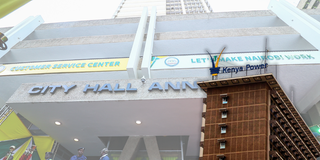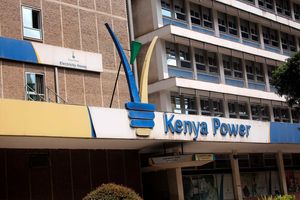
City Hall Annexe and Kenya Power, Electricity House in Nairobi County.
Kenya Power and the Nairobi County Government on Monday tried to sabotage each other's operations as a dispute over unpaid bills turned ugly.
The situation took an unexpected turn when the county's truck dumped garbage outside Stima Plaza in Parklands area in retaliation for Kenya Power's move to disconnect power to City Hall and other areas.
The county also disconnected water and sewer lines, leading to a total shutdown of the plaza as no business was conducted there.
The county also clamped down on some of the vehicles parked outside Stima Plaza and its offices in Nairobi CBD.
Speaking on the matter, Kenya Power Commercial Services General Manager Eng. Rosemary Oduor described the move as unacceptable and accused the county of failing to pay its Sh3 billion electricity bill.
“They have towed away a few vehicles and some remain clamped. The garbage is at the entrance of our building and there are several trucks around our building carrying garbage,” Eng Oduor said.
According to her, they had agreed last year that the county would start paying their electricity bills on a monthly basis while they worked on plans to settle the outstanding bill, which the county failed to honour.
“By one not paying their bills, they are denying the sector the necessary revenue for us to be able to offer electricity service which is a very critical service to the nation and to the citizens of this nation.”
Eng Oduor said that the company was using all means possible to reach out to the county to address their issues and restore services which affected operations on Monday.
On the other hand, the county accused Kenya Power of disconnecting electricity from their premises yet they also do have arrears which they have failed to pay despite frequent notices asking them to consider.
Acting County Secretary Godfrey Akumali said that Kenya Power has refused to pay annual wayleave rental fees amounting to Sh4.8 billion.
“It is our considered opinion as the county government of Nairobi that KPLC has an obligation to meet its statutory demands. That means that KPLC, in the same way that they ask the rest of us to pay their bills, have a duty and responsibility to pay Nairobi City County for the services we offer them including the service of wayleaves and land rates that they have within the Nairobi City County,” Mr Akumali said.
The county accused Kenya Power of playing the victim when they knew that they owed the county millions of money, including Sh17 million in land rates for the current year.
“KPLC should not play small brother. They should know that for sure they owe us. They know that demand notices have been sent to them. They need to pay us their debts.”
According to the County, the move to disrupt services at the Kenya Power offices in Nairobi was the last option that they had to apply to force the company to pay their levies.
“We have taken the measures against KPLC while aware that they are aware of the debts that they owe us and well aware that by so doing, we will compel them to come up and pay what they owe us.”
Mr Akumali argued that Kenya Power recently announced that it made profits and yet they are not ready to negotiate on a payment plan.
He said that a similar measure would be used to compel other defaulters to settle their bills and allow the county to run its operation smoothly.
“We are telling all other defaulters, you have seen what we are doing to the assumed big brother, we are coming for you. You have to pay your rates, you have to pay our levies.”
Charles Kerich, who is the Finance and Planning County Executive Committee Member (CEC) said that Kenya Power was causing confusion to divert from the main issue, which is pending bills.
“The action that the county has taken has to do with wayleaves, nothing else. We have written letters upon letters with not a single response,” Mr Kerich said.
According to Mr Kerich, Kenya Power had argued in the case before the court of appeal that if they paid wayleaves to the county government, they would become insolvent.
However, the county revealed that Kenya Power was deliberately refusing to pay wayleaves to the county since other counties would demand payment for such services.
“The reality is that the law allows the county to collect wayleaves and we have been collecting and suddenly they have decided that they do not want to pay.”
Also, the CEC alleged that the fibre companies that were previously paying wayleaves to the county to pass cables underground are no longer doing so since they opted to use Kenya Power posts to distribute their services.







